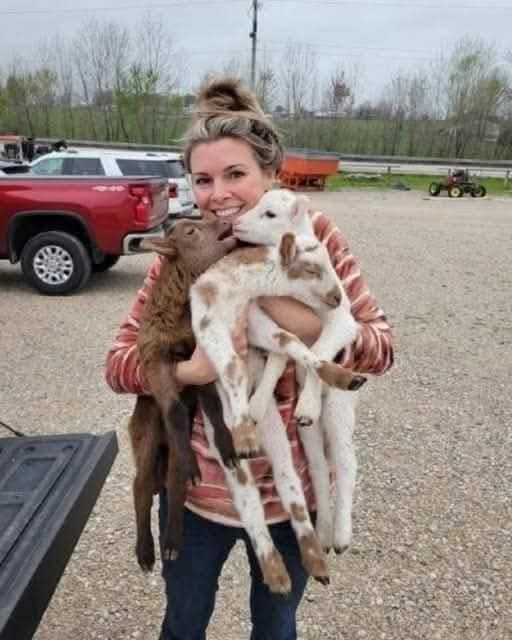My car idled on a dusty stretch of road as grief pressed in around me. I was numb, aimless, broken by loss and longing, and I only wanted to drive until the pavement ended. I hadn’t intended to turn into the auction grounds. But the gate was open, the vehicles sparse, and I slowed.
Inside, the air smelled of hay and dust, warmed slightly by the sun that filtered through open bay doors. The chatter of voices and the dull clink of metal cages met my ears, but I barely paid attention. All I felt was a heavy weight in my chest, as though I carried all the sorrow of a lifetime on my ribs.
Then I saw them: three little goats, shivering, pressed close together. Their coats were ragged, thin in places. Their eyes looked lost. They were labeled “unsold leftovers” — destined for feed, they said.
I paused. I told myself I should go. I told myself I couldn’t take anything else onto my already burdened heart. But memories flooded in: my mother’s last words, echoed in my mind with an almost desperate clarity: “Don’t leave the soft things behind.”
Soft things. She had always said that. She believed in gentleness, in mercy — in caring for what others discarded. In that moment, something inside me cracked open.
I walked up and told the auctioneer I wanted them. He raised his eyebrows. The goats were off the lot — no buyer. He shrugged. “Take them, then.” And so I did.

That very night, I hammered together a makeshift pen from scrap wood and wire — cobbled materials I found around my property. It wasn’t pretty. But it was warm, and it was shelter.
I carried them inside, one by one, letting them climb onto my lap. Their bodies were small and trembling. I held them close, felt their warmth press into my legs, their tiny hearts thumping. In the silence, I heard my own breath catch. Tears slipped down.
For the first time since her funeral, I laughed — quietly, softly. It felt like a release, like a crack in the wall of sorrow.
They were gentle then, easing into new rhythms. They followed me around. They nibbled hay, licked fingers, bleated softly at dawn. I found myself waking early, giving them food, letting them rest close. I spoke to them, telling them about her. Telling them about how much I missed her.
In caring for them, I began to care for myself again. The weight on my chest loosened, just a little. I started to look out the window in the mornings. I let sunlight slip in. I let hope trickle in.
Over weeks, they grew stronger. Their coats thickened; their voices rang out. People came by to see the goats. Some offered to buy them. Some whispered about the cost. But I couldn’t part with them. They were more than animals to me — they’d become living threads in the fabric of my healing.
One evening, I crouched beside them in the pen and watched shadows stretch across the yard. The goats nudged me with gentle heads, as though asking me to stay. I closed my eyes and exhaled, letting the grief settle — not like a crushing weight, but like a memory that’s no longer sharp enough to split me in two.
I hadn’t intended to stop at that auction. I had no plans to save anything. I wanted to vanish. But those kids saved me. They reminded me that tenderness matters. That in the brokenness, there can be connection. There can be tomorrow.
I still feel the ache — still miss her. But now there’s also a light in my chest, a spark that whispers: keep going. Let the soft things in.